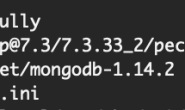先提醒下:升级有危险,为了安全请备份重要数据!!!!
言归正传,升级步骤如下:
wget -q -O – http://www.atomicorp.com/installers/atomic.sh | sh
yum upgrade
service httpd restart
这里可能会丢失一些原本php安装的扩展,需要重新一一安装,比如我这里原来安装的php memcache扩展就不能用了,重新安装步骤如下:
wget http://pecl.php.net/get/memcache-3.0.5.tgz
tar -xvzf memcache-3.0.5.tgz
cd memcache-3.0.5
phpize
./configure
make && make install
service httpd restart
可以用弄个phpinfo();的php页面检查下有没有加载php memcache扩展
参考网站:http://www.atomicorp.com/wiki/index.php/PHP
如果atomic.sh 已不存在,可参考如下:
#!/bin/sh
# Name: Atomic Archive configuration script
# License: GPLv3
# Amazon, this doesn’t help anyone.
if [ -f /etc/system-release ]; then
ln -sf /etc/system-release /etc/redhat-release
fi
if [ ! -f /etc/redhat-release ]; then
echo “Error: /etc/redhat-release was not detected”
exit 1
fi
RELEASE=`cat /etc/redhat-release | awk -F\( ‘{print $1}’`
ATOMIC_VER=”2.0.5″
VERSION=”1.0-14″
SERVER=atomicorp.com
ARCH=`uname -i`
REDHAT=0
# Input validation function
# check_input <msg> <valid responses regex> <default>
# if <default> is passed on as null, then there is no default
# Example: check_input “Some question (yes/no) ” “yes|no” “yes”
function check_input {
message=$1
validate=$2
default=$3
while [ $? -ne 1 ]; do
echo -n “$message “
read INPUTTEXT < /dev/tty
if [ “$INPUTTEXT” == “” -a “$default” != “” ]; then
INPUTTEXT=$default
return 1
fi
echo $INPUTTEXT | egrep -q “$validate” && return 1
echo “Invalid input”
done
}
echo
echo “Atomic Archive installer, version $ATOMIC_VER”
echo
echo “BY INSTALLING THIS SOFTWARE AND BY USING ANY AND ALL SOFTWARE”
echo “PROVIDED BY ATOMICORP LIMITED YOU ACKNOWLEDGE AND AGREE:”
echo
echo “THIS SOFTWARE AND ALL SOFTWARE PROVIDED IN THIS REPOSITORY IS “
echo “PROVIDED BY ATOMICORP LIMITED AS IS, IS UNSUPPORTED AND ANY”
echo “EXPRESS OR IMPLIED WARRANTIES, INCLUDING, BUT NOT LIMITED TO, THE”
echo “IMPLIED WARRANTIES OF MERCHANTABILITY AND FITNESS FOR A PARTICULAR”
echo “PURPOSE ARE DISCLAIMED. IN NO EVENT SHALL ATOMICORP LIMITED, THE”
echo “COPYRIGHT OWNER OR ANY CONTRIBUTOR TO ANY AND ALL SOFTWARE PROVIDED”
echo “BY OR PUBLISHED IN THIS REPOSITORY BE LIABLE FOR ANY DIRECT,”
echo “INDIRECT, INCIDENTAL, SPECIAL, EXEMPLARY, OR CONSEQUENTIAL DAMAGES”
echo “(INCLUDING, BUT NOT LIMITED TO, PROCUREMENT OF SUBSTITUTE GOODS”
echo “OR SERVICES; LOSS OF USE, DATA, OR PROFITS; OR BUSINESS INTERRUPTION)”
echo “HOWEVER CAUSED AND ON ANY THEORY OF LIABILITY, WHETHER IN CONTRACT,”
echo “STRICT LIABILITY, OR TORT (INCLUDING NEGLIGENCE OR OTHERWISE)”
echo “ARISING IN ANY WAY OUT OF THE USE OF THIS SOFTWARE, EVEN IF ADVISED”
echo “OF THE POSSIBILITY OF SUCH DAMAGE.”
echo
if [ ! $NON_INT ]; then
check_input “Do you agree to these terms? (yes/no) [Default: yes]” “yes|no” “yes”
query=$INPUTTEXT
fi
if [ “$query” == “no” ]; then
echo “Exiting”
echo
exit 1
fi
echo
echo “Configuring the [atomic] yum archive for this system ”
echo
if grep -q “Red Hat Linux release 9 ” /etc/redhat-release ; then
DIST=”rh9″
DIR=redhat/9
echo
echo “$RELEASE is no longer supported.”
echo
exit 1
elif grep -q “Fedora Core release 2 ” /etc/redhat-release ; then
DIST=”fc2″
DIR=fedora/2
echo
echo “$RELEASE is no longer supported.”
echo
exit 1
elif grep -q “Fedora Core release 3 ” /etc/redhat-release ; then
DIST=”fc3″
DIR=fedora/3
echo
echo “$RELEASE is no longer supported.”
echo
exit 1
#YUMDEPS=”fedora-release python-elementtree python-sqlite python-urlgrabber yum”
elif grep -q “Fedora Core release 4 ” /etc/redhat-release ; then
DIST=”fc4″
DIR=fedora/4
YUMDEPS=”fedora-release python-elementtree python-sqlite python-urlgrabber yum”
PLESKREPO=”plesk-fedora”
elif grep -q “Fedora Core release 5 ” /etc/redhat-release ; then
DIST=”fc5″
DIR=fedora/5
YUMDEPS=”fedora-release python-elementtree python-sqlite python-urlgrabber yum”
PLESKREPO=”plesk-fedora”
elif grep -q “Fedora Core release 6 ” /etc/redhat-release ; then
DIST=”fc6″
DIR=fedora/6
YUMDEPS=”fedora-release python-elementtree python-sqlite python-urlgrabber yum rpm-python”
PLESKREPO=”plesk-fedora”
elif grep -q “Fedora release 7 ” /etc/redhat-release ; then
DIST=”fc7″
DIR=fedora/7
YUMDEPS=”fedora-release python-elementtree python-sqlite python-urlgrabber yumrpm-python”
PLESKREPO=”plesk-fedora”
elif grep -q “Fedora release 8 ” /etc/redhat-release ; then
DIST=”fc8″
DIR=fedora/8
YUMDEPS=”fedora-release python-elementtree python-sqlite python-urlgrabber yumrpm-python”
PLESKREPO=”plesk-fedora”
elif grep -q “Fedora release 9 ” /etc/redhat-release ; then
DIST=”fc9″
DIR=fedora/9
YUMDEPS=”fedora-release python-elementtree python-sqlite python-urlgrabber yumrpm-python”
PLESKREPO=”plesk-fedora”
DISABLE_PLESK=yes
elif grep -q “Fedora release 10 ” /etc/redhat-release ; then
DIST=”fc10″
DIR=fedora/10
YUMDEPS=”fedora-release python-elementtree python-sqlite python-urlgrabber yumrpm-python”
PLESKREPO=”plesk-fedora”
DISABLE_PLESK=yes
elif grep -q “Fedora release 11 ” /etc/redhat-release ; then
DIST=”fc11″
DIR=fedora/11
YUMDEPS=”fedora-release python-elementtree python-sqlite python-urlgrabber yumrpm-python”
PLESKREPO=”plesk-fedora”
DISABLE_PLESK=yes
elif grep -q “Fedora release 12 ” /etc/redhat-release ; then
DIST=”fc12″
DIR=fedora/12
YUMDEPS=”fedora-release python-elementtree python-sqlite python-urlgrabber yumrpm-python”
PLESKREPO=”plesk-fedora”
DISABLE_PLESK=yes
elif grep -q “Fedora release 13 ” /etc/redhat-release ; then
DIST=”fc13″
DIR=fedora/13
YUMDEPS=”fedora-release python-elementtree python-sqlite python-urlgrabber yumrpm-python”
PLESKREPO=”plesk-fedora”
DISABLE_PLESK=yes
elif grep -q “Fedora release 14 ” /etc/redhat-release ; then
DIST=”fc14″
DIR=fedora/14
YUMDEPS=”fedora-release python-elementtree python-sqlite python-urlgrabber yumrpm-python”
PLESKREPO=”plesk-fedora”
DISABLE_PLESK=yes
elif grep -q “Fedora release 15 ” /etc/redhat-release ; then
DIST=”fc15″
DIR=fedora/15
YUMDEPS=”fedora-release python-elementtree python-sqlite python-urlgrabber yumrpm-python”
PLESKREPO=”plesk-fedora”
DISABLE_PLESK=yes
elif grep -q “Fedora release 16 ” /etc/redhat-release ; then
DIST=”fc16″
DIR=fedora/16
YUMDEPS=”fedora-release python-elementtree python-sqlite python-urlgrabber yumrpm-python”
PLESKREPO=”plesk-fedora”
DISABLE_PLESK=yes
elif egrep -q “Red Hat Enterprise Linux (A|E)S release 3 ” /etc/redhat-release ; then
DIST=”el3″
DIR=redhat/3
echo
echo “$RELEASE is not supported at this time, you will need to configure yum manually:”
echo “see http://$SERVER/channels for instructions”
echo
exit 1
elif grep -q “CentOS release 3” /etc/redhat-release ; then
DIST=”el3″
DIR=centos/3
echo
echo “$RELEASE is not supported at this time, you will need to configure yum manually:”
echo “see http://$SERVER/channels for instructions”
echo
exit 1
elif egrep -q “Red Hat Enterprise Linux (A|E|W)S release 4” /etc/redhat-release ; then
REDHAT=1
DIST=”el4″
DIR=redhat/4
YUMDEPS=”python-elementtree python-sqlite python-urlgrabber yum sqlite”
PLESKREPO=”plesk-redhat”
elif egrep -q “Red Hat Enterprise Linux.*release 5” /etc/redhat-release ; then
REDHAT=1
DIST=”el5″
DIR=redhat/5
YUMDEPS=”rpm-python python-elementtree python-sqlite python-urlgrabber yum sqlite”
PLESKREPO=”plesk-redhat”
elif egrep -q “Red Hat Enterprise Linux.*release 6” /etc/redhat-release ; then
REDHAT=1
DIST=”el6″
DIR=redhat/6
YUMDEPS=”rpm-python python-elementtree python-sqlite python-urlgrabber yum sqlite”
PLESKREPO=”plesk-redhat”
elif grep -q “CentOS release 3” /etc/redhat-release ; then
DIST=”el3″
DIR=centos/3
YUMDEPS=”centos-release python-elementtree python-sqlite python-urlgrabber yum sqlite”
PLESKREPO=”plesk-centos”
elif grep -q “CentOS release 4” /etc/redhat-release ; then
DIST=”el4″
DIR=centos/4
YUMDEPS=”centos-release python-elementtree python-sqlite python-urlgrabber yum sqlite”
PLESKREPO=”plesk-centos”
elif egrep -q “(release 5|release 2011)” /etc/redhat-release ; then
DIST=”el5″
DIR=centos/5
YUMDEPS=”rpm-python centos-release python-elementtree python-sqlite python-urlgrabber yum sqlite m2crypto”
PLESKREPO=”plesk-centos”
# Fc6 uses “release 6” so we need the whole thing here
elif egrep -q “(release 6|release 2012)” /etc/redhat-release ; then
DIST=”el6″
DIR=centos/6
YUMDEPS=”rpm-python centos-release python-elementtree python-sqlite python-urlgrabber yum sqlite m2crypto”
PLESKREPO=”plesk-centos”
else
echo “Error: Unable to determine distribution type. Please send the contents of /etc/redhat-release to support@atomicorp.com”
exit 1
fi
ATOMIC=atomic-release-$VERSION.$DIST.art.noarch.rpm
# for up2date
SOURCES=”yum atomic http://www.atomicorp.com/channels/atomic/$DIR/$ARCH”
# Yum install function
function installyum {
opts=$1
if [ ! -d atomic/yumdeps ]; then
mkdir -p atomic/yumdeps/
fi
cd atomic/yumdeps
if [ -f $DIST-$ARCH-yumdeps.tar.gz ]; then
rm -f $DIST-$ARCH-yumdeps.tar.gz
fi
#echo “wget -q http://$SERVER/installers/yum/$DIST-$ARCH-yumdeps.tar.gz”
wget -q http://$SERVER/installers/yum/$DIST-$ARCH-yumdeps.tar.gz || exit 1
tar zxf $DIST-$ARCH-yumdeps.tar.gz
for i in $YUMDEPS; do
rpm –quiet –queryformat=%{NAME} -q $i || INSTALLDEPS=”$i*rpm $INSTALLDEPS”
done
#echo “DEBUG $INSTALLDEPS”
rpm -Uvh $opts $INSTALLDEPS
}
echo -n “Installing the Atomic GPG key: “
if [ ! -f RPM-GPG-KEY.art.txt ]; then
wget -q https://www.atomicorp.com/RPM-GPG-KEY.art.txt 1>/dev/null 2>&1
fi
rpm -import RPM-GPG-KEY.art.txt >/dev/null 2>&1
echo “OK”
rm -f RPM-GPG-KEY.art.txt
if [ ! -f /usr/bin/yum ]; then
echo “Yum was not detected. Attempting to resolve.. “
echo
# If were on RHEL4, ask if they want to convert to centos, or use up2date
if [ “$REDHAT” == “1” ]; then
echo
echo “Redhat Enterprise Linux Detected..”
echo ” If you do not have a valid RHEL subscription, this utility can be used”
echo ” to convert this system to centos. If you do have a valid subscription”
echo ” just hit enter, or n to continue. The installer will add the [atomic]”
echo ” channel to up2date, and *attempt* to install yum.”
echo
#echo -n “Convert this system to CentOS? (y/n) [Default: no]: “
#read useyum < /dev/tty
check_input “Convert this system to CentOS? (y/n) [Default: n]:” “y|n” “n”
useyum=$INPUTTEXT
if [ “$useyum” == “y” ]; then
echo “Installing yum from CentOS”
YUMDEPS=”centos-release $YUMDEPS”
PLESKREPO=”plesk-centos”
installyum
else
echo “Attempting to configure [atomic] for up2date”
if egrep -q “^yum atomic” /etc/sysconfig/rhn/sources ; then
echo “atomic channel detected”
else
echo $SOURCES >> /etc/sysconfig/rhn/sources
fi
echo “Attempting to set up yum for RHEL”
echo -n ” Installing RPM GPG key: “
wget -q http://www.atomicorp.com/installers/yum/RPM-GPG-KEY-c4 1>/dev/null 2>&1
rpm -import RPM-GPG-KEY-c4 >/dev/null 2>&1
echo “OK”
installyum “–nodeps”
YUM=1
fi
else
# for everyone else
installyum
YUM=1
fi
else
YUM=1
fi
if [ “$YUM” == “1” ]; then
ATOMICRELEASE=0
rpm –quiet -q atomic-release || ATOMICRELEASE=1
if [ $ATOMICRELEASE -ge 1 ]; then
echo -n “Downloading $ATOMIC: “
wget -q http://$SERVER/channels/atomic/$DIR/$ARCH/RPMS/$ATOMIC >/dev/null 2>&1 || exit $?
if [ -f $ATOMIC ]; then
rpm -Uvh $ATOMIC >/dev/null 2>&1
rm -f $ATOMIC
else
echo “ERROR: $ATOMIC was not downloaded.”
exit 1
fi
echo “OK”
fi
fi
if [ -f /etc/yum.repos.d/plesk.repo ]; then
rm -f /etc/yum.repos.d/plesk.repo
fi
DISABLE_PLESK=yes
if [ “$DISABLE_PLESK” == “yes” ] ; then
echo
else
echo
echo “Would you like to add the Plesk yum repository to the system?”
echo
check_input “Enable Plesk repository? (y/n) [Default: n]:” “y|n” “n”
useplesk=$INPUTTEXT
if [ “$useplesk” == “y” ]; then
#Version
echo
echo “Plesk 8.6 and 9.2 repositories are available:”
echo “NOTE: Plesk 9 repos are only available for rhel/centos 4 and 5”
echo
check_input “Enable Plesk 8.6 or 9.2? (8/9) [Default: 8]:” “8|9” “8”
PSA_VERSION=$INPUTTEXT
# Remove the old repo’s
if [ -f /etc/yum.repos.d/plesk.repo ] ; then
rm -f /etc/yum.repos.d/plesk.repo
fi
wget -q -O /etc/yum.repos.d/plesk.repo http://$SERVER/installers/repos/$PLESKREPO-$PSA_VERSION.repo
fi
fi
echo
echo
echo “The Atomic Rocket Turtle archive has now been installed and configured for your system”
echo “The following channels are available:”
echo ” atomic – [ACTIVATED] – contains the stable tree of ART packages”
echo ” atomic-testing – [DISABLED] – contains the testing tree of ART packages”
echo ” atomic-bleeding – [DISABLED] – contains the development tree of ART packages”
echo
echo
转载请注明:苏demo的别样人生 » centos5.5用yum升级PHP和mysql版本到php5.2.x mysql5.1.x

 微信扫一扫,打赏作者吧~
微信扫一扫,打赏作者吧~


